Award
-
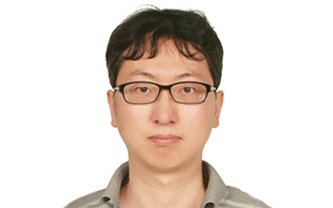 Professor Lee Recognized by the KMS as Best Paper Awardee
Professor Ji Oon Lee of the Department of Mathematical Sciences was selected as the 2017 Best Paper Awardee by the Korean Mathematical Society. The award will be presented during the KMS spring meeting on April 29. Dr. Lee is being honored for proving a necessary and sufficient condition for the Tracy-Wisdom law of Wigner matrices. In a paper titled ‘A Necessary and Sufficient Condition for Edge Universality of Wigner Matrices,’ he proposed a solution for one of the many unanswered problems in the field of random matrix theory that have existed for decades. The paper, co-authored with Professor Jun Yin at the University of Wisconsin – Madison, was published in the Duke Mathematical Journal in 2014. Professor Lee joined KAIST in 2010 after finishing his Ph.D. at Harvard University. He was named a ‘POSCI Science Fellow’ and received the ‘Young Scientist Award’ from the KMS in 2014.
2017.04.27 View 9673
Professor Lee Recognized by the KMS as Best Paper Awardee
Professor Ji Oon Lee of the Department of Mathematical Sciences was selected as the 2017 Best Paper Awardee by the Korean Mathematical Society. The award will be presented during the KMS spring meeting on April 29. Dr. Lee is being honored for proving a necessary and sufficient condition for the Tracy-Wisdom law of Wigner matrices. In a paper titled ‘A Necessary and Sufficient Condition for Edge Universality of Wigner Matrices,’ he proposed a solution for one of the many unanswered problems in the field of random matrix theory that have existed for decades. The paper, co-authored with Professor Jun Yin at the University of Wisconsin – Madison, was published in the Duke Mathematical Journal in 2014. Professor Lee joined KAIST in 2010 after finishing his Ph.D. at Harvard University. He was named a ‘POSCI Science Fellow’ and received the ‘Young Scientist Award’ from the KMS in 2014.
2017.04.27 View 9673 -
 KAIST Celebrates the 2017 Commencement
KAIST hosted its 2017 Commencement, awarding diplomas to 2,767 members of the Class of 2017 during a ceremony on February 17. President Sung-Mo Kang, Minister Yang-hee Choi of Science, ICT, and Future Planning, and Chairman of the KAIST Board of Trustees Jang-Moo Lee joined the ceremony along with the graduates and their family and friends at the Ryu Keun Chul Sports Complex.
The graduating class included 638 Ph.D. degrees, 1,335 Master’s degrees, and 794 Bachelor’s degrees being conferred. Among them, Young-Ki Song from the Department of Electric Engineering was honored to win the Minister’s Award, the highest award bestowed to an undergraduate. The KAIST Presidential Award went to Min-Jae Park of the Department of Mathematical Sciences and the KAIST Board of Trustee Chairman’s Award was presented to Jae-Hyung Cho from the Department of Mechanical Engineering.
Including this year’s graduating class, KAIST has turned out more than 59,000 highly educated science and technology talents including 11,731 Ph.D.s since its foundation in 1971. This year, 24-year-old Seo-Hee Oh earned her Ph.D. in chemistry as the youngest Ph.D. of the year after completing her Master’s and Ph.D. combined course in three years.
President Sung-Mo Kang praised the creativity of this graduating class and their excellent ability in his charge, saying, “As future leaders of our society, you are expected to develop a sense of compassion and outstanding professionalism to contribute to the advancement of not only Korea but also the whole world.’
For full text of President Kang’s charge to the graduates, please click.
2017.02.17 View 9414
KAIST Celebrates the 2017 Commencement
KAIST hosted its 2017 Commencement, awarding diplomas to 2,767 members of the Class of 2017 during a ceremony on February 17. President Sung-Mo Kang, Minister Yang-hee Choi of Science, ICT, and Future Planning, and Chairman of the KAIST Board of Trustees Jang-Moo Lee joined the ceremony along with the graduates and their family and friends at the Ryu Keun Chul Sports Complex.
The graduating class included 638 Ph.D. degrees, 1,335 Master’s degrees, and 794 Bachelor’s degrees being conferred. Among them, Young-Ki Song from the Department of Electric Engineering was honored to win the Minister’s Award, the highest award bestowed to an undergraduate. The KAIST Presidential Award went to Min-Jae Park of the Department of Mathematical Sciences and the KAIST Board of Trustee Chairman’s Award was presented to Jae-Hyung Cho from the Department of Mechanical Engineering.
Including this year’s graduating class, KAIST has turned out more than 59,000 highly educated science and technology talents including 11,731 Ph.D.s since its foundation in 1971. This year, 24-year-old Seo-Hee Oh earned her Ph.D. in chemistry as the youngest Ph.D. of the year after completing her Master’s and Ph.D. combined course in three years.
President Sung-Mo Kang praised the creativity of this graduating class and their excellent ability in his charge, saying, “As future leaders of our society, you are expected to develop a sense of compassion and outstanding professionalism to contribute to the advancement of not only Korea but also the whole world.’
For full text of President Kang’s charge to the graduates, please click.
2017.02.17 View 9414 -
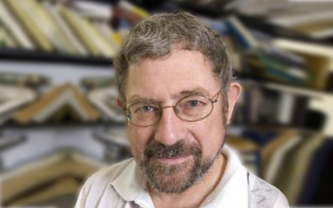 Nobel Laureate Dr. John Michael Kosterlitz Speaks at KAIST
KAIST’s Department of Physics will invite one of three co-recipients of the Nobel Prize in Physics 2016, Professor John Michael Kosterlitz of Brown University, on January 9, 2017, to speak about the exotic states of matter, which is entitled “Topological Defects and Phase Transitions.”
Professor Kosterlitz shares the Nobel award with two other researchers, David Thouless and Duncan Haldane. He is considered one of the pioneers in the field of topological phases. In the early 1970s, along with Thouless, he demonstrated that superconductivity could occur at low temperatures and explained the mechanism behind, phase transition, that makes superconductivity disappear at higher temperatures.
Over the last decade, topological materials and their applications have been widely studied with the hope of using them in new generations of electronics and superconductors, or in future quantum computers. Details of the lecture follow below:
Distinguished Lecture Series by KAIST’s Physics Department
· Speaker: Professor John Michael Kosterlitz of the Physics Department,
Brown University
· Topic: “Topological Defects and Phase Transitions”
· Date: January 9, 2017, 4:00 PM
· Place: Lecture Hall (#1501), College of Natural Sciences (E6-2)
2017.01.06 View 7736
Nobel Laureate Dr. John Michael Kosterlitz Speaks at KAIST
KAIST’s Department of Physics will invite one of three co-recipients of the Nobel Prize in Physics 2016, Professor John Michael Kosterlitz of Brown University, on January 9, 2017, to speak about the exotic states of matter, which is entitled “Topological Defects and Phase Transitions.”
Professor Kosterlitz shares the Nobel award with two other researchers, David Thouless and Duncan Haldane. He is considered one of the pioneers in the field of topological phases. In the early 1970s, along with Thouless, he demonstrated that superconductivity could occur at low temperatures and explained the mechanism behind, phase transition, that makes superconductivity disappear at higher temperatures.
Over the last decade, topological materials and their applications have been widely studied with the hope of using them in new generations of electronics and superconductors, or in future quantum computers. Details of the lecture follow below:
Distinguished Lecture Series by KAIST’s Physics Department
· Speaker: Professor John Michael Kosterlitz of the Physics Department,
Brown University
· Topic: “Topological Defects and Phase Transitions”
· Date: January 9, 2017, 4:00 PM
· Place: Lecture Hall (#1501), College of Natural Sciences (E6-2)
2017.01.06 View 7736 -
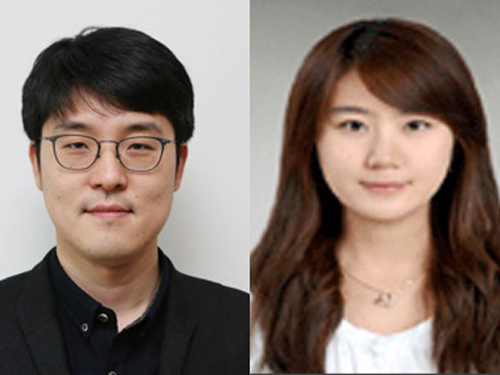 EEWS Graduate School Team Receives the S-Oil Best Paper Award
Professor Hyungjun Kim and Dr. He-Young Shin from the EEWS (Energy, Environment, Water and Sustainability) Graduate School at KAIST received the Best Paper Award in Chemistry from S-Oil, a Korean petroleum and refinery company, on November 29, 2016.
Established in 2011, the S-Oil Best Paper Awards are bestowed annually upon ten young scientists in the fields of five basic sciences: mathematics, physics, chemistry, biology, and earth science. The scientists are selected at the recommendation of the Korean Academy of Science and Technology and the Association of Korean Universities. The awards grant a total of USD 230,000 for research funding.
Dr. Shin, the lead author of the awarded research paper, said, “My research interest has been catalyst studies based on theoretical chemistry. I am pleased to accept this award that will support my studies, and will continue to research catalyst design that can predict parameters and integrate them into catalytic systems.”
Professor Hyungjun Kim (left) and Dr. He-Young Shin (right)
2016.12.23 View 10637
EEWS Graduate School Team Receives the S-Oil Best Paper Award
Professor Hyungjun Kim and Dr. He-Young Shin from the EEWS (Energy, Environment, Water and Sustainability) Graduate School at KAIST received the Best Paper Award in Chemistry from S-Oil, a Korean petroleum and refinery company, on November 29, 2016.
Established in 2011, the S-Oil Best Paper Awards are bestowed annually upon ten young scientists in the fields of five basic sciences: mathematics, physics, chemistry, biology, and earth science. The scientists are selected at the recommendation of the Korean Academy of Science and Technology and the Association of Korean Universities. The awards grant a total of USD 230,000 for research funding.
Dr. Shin, the lead author of the awarded research paper, said, “My research interest has been catalyst studies based on theoretical chemistry. I am pleased to accept this award that will support my studies, and will continue to research catalyst design that can predict parameters and integrate them into catalytic systems.”
Professor Hyungjun Kim (left) and Dr. He-Young Shin (right)
2016.12.23 View 10637 -
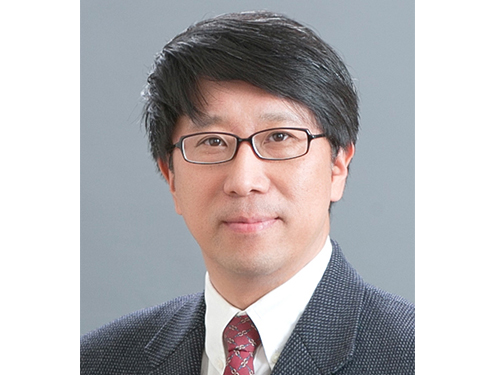 Professor Dongman Lee Wins the 2016 Korea Internet Award
Professor Dongman Lee of KAIST’s School of Computing received the 11th Korea Internet Award in the category of personal achievement on December 13 at the Creative Economy and Innovation Center in Gyeonggi province.
Hosted by the Ministry of Science, ICT and Future Planning of Korea, the Internet Award recognizes leaders in the Internet industry and their contributions.
Since 2010, Professor Lee has conducted research on the Internet of Things (IoT) platforms, resulting in the publication of five research papers in Science Citation Index (SCI) journals, ten papers in Korean journals, 30 best papers nominations at international conferences, and the registration of eleven patents. He has also worked on the creation of an IoT ecosystem through his research on object interworking platforms that can provide diverse user-customized services in the IoT environment.
His research team built a test bed for applicable IoT platforms on the 8th floor of the IT Convergence Center on campus to implement experiments and collect various data, thereby creating a foundation to carry out research projects in this field.
Professor Lee has helped the advancement of an Internet governance system in Korea by researching Internet governance policies, holding important posts in related academic societies including the Chairman of the Korea Internet Governance Alliance (KIGA) Council, and hosting major conferences such as the Asia Pacific Regional Internet Governance Forum (APrIGF).
2016.12.20 View 8724
Professor Dongman Lee Wins the 2016 Korea Internet Award
Professor Dongman Lee of KAIST’s School of Computing received the 11th Korea Internet Award in the category of personal achievement on December 13 at the Creative Economy and Innovation Center in Gyeonggi province.
Hosted by the Ministry of Science, ICT and Future Planning of Korea, the Internet Award recognizes leaders in the Internet industry and their contributions.
Since 2010, Professor Lee has conducted research on the Internet of Things (IoT) platforms, resulting in the publication of five research papers in Science Citation Index (SCI) journals, ten papers in Korean journals, 30 best papers nominations at international conferences, and the registration of eleven patents. He has also worked on the creation of an IoT ecosystem through his research on object interworking platforms that can provide diverse user-customized services in the IoT environment.
His research team built a test bed for applicable IoT platforms on the 8th floor of the IT Convergence Center on campus to implement experiments and collect various data, thereby creating a foundation to carry out research projects in this field.
Professor Lee has helped the advancement of an Internet governance system in Korea by researching Internet governance policies, holding important posts in related academic societies including the Chairman of the Korea Internet Governance Alliance (KIGA) Council, and hosting major conferences such as the Asia Pacific Regional Internet Governance Forum (APrIGF).
2016.12.20 View 8724 -
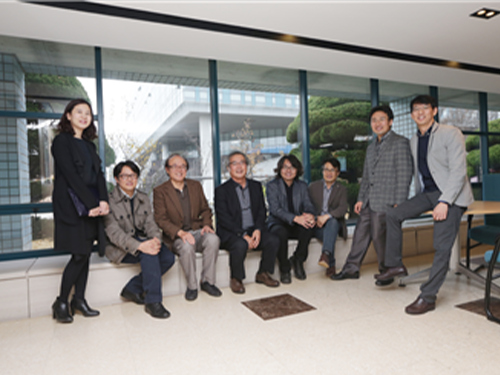 Mobile Software Platform Research Center Recognized by the MSIP
The Mobile Software Platform Research Center (MSPRC) at KAIST received an award from the Minister of Science, ICT and Future Planning of Korea on November 29, 2016, at Coex in Seoul. The award was presented at the Conference of Software R&D Annual Report 2016 hosted by the Ministry of Science, ICT and Future Planning (MISP) and the Institute for Information and Communications Technology Promotion (IITP).
The research center developed user experience (UX)-oriented mobile software platforms that support the invention of next-generation UX service technologies. The center has filed 37 patents and registered 15 technologies. Its researchers received ten Best Paper Awards and published a total of 133 papers in Korean and international journals.
Research teams at MSPRC expect that their software platforms will offer training programs for software engineers and new UX services. They also said that their extensive event processing platforms would reduce energy consumption on mobile devices.
Professor Seungryoul Maeng of the School of Computing, the Director of MSPRC, said, “This is a great honor for us. I am greatly thankful for the teamwork of participating departments--Computer Science, Industrial Design, and Industrial and Systems Engineering. We will continue to introduce our research outcomes and to work towards commercializing these results.”
Members of the Mobile Software Platform Research Center, KAIST
2016.12.07 View 7569
Mobile Software Platform Research Center Recognized by the MSIP
The Mobile Software Platform Research Center (MSPRC) at KAIST received an award from the Minister of Science, ICT and Future Planning of Korea on November 29, 2016, at Coex in Seoul. The award was presented at the Conference of Software R&D Annual Report 2016 hosted by the Ministry of Science, ICT and Future Planning (MISP) and the Institute for Information and Communications Technology Promotion (IITP).
The research center developed user experience (UX)-oriented mobile software platforms that support the invention of next-generation UX service technologies. The center has filed 37 patents and registered 15 technologies. Its researchers received ten Best Paper Awards and published a total of 133 papers in Korean and international journals.
Research teams at MSPRC expect that their software platforms will offer training programs for software engineers and new UX services. They also said that their extensive event processing platforms would reduce energy consumption on mobile devices.
Professor Seungryoul Maeng of the School of Computing, the Director of MSPRC, said, “This is a great honor for us. I am greatly thankful for the teamwork of participating departments--Computer Science, Industrial Design, and Industrial and Systems Engineering. We will continue to introduce our research outcomes and to work towards commercializing these results.”
Members of the Mobile Software Platform Research Center, KAIST
2016.12.07 View 7569 -
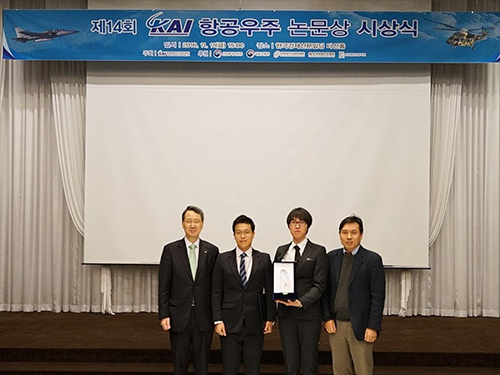 Aerospace Engineering Students Win the Minister's Award
On November 11, 2016, students from KAIST’s Aerospace Engineering Department won the Minister’s Award of Trade, Industry and Energy of Korea at the 14th Research Paper Competition hosted by Korea Aerospace Industries (KAI). The award came with a cash prize of USD 1,200 as well as opportunities to visit international airshows held abroad.
The KAIST students' paper introduced a novel design concept for "a virtual-fighter-pilot system for unmanned combat aerial vehicles to enable them to engage in mass aerial combat."
This was one of the two highest honors given to contestants. A group of students from Korea Aerospace University received the other grand prize from the Minister of Land, Infrastructure and Transport of Korea.
The KAIST team consisted of two doctoral students, Hee-Min Shin and Jae-Hyun Lee, and one Master’s student, Hyun-Gi Kim. Their advisor, Professor “David” Hyunchul Shim, received the Special Achievement Award for his contribution to the paper.
KAI’s competition was established in 2003 to spur academic interest and research in aerospace engineering. Over the past 14 years, contestants have submitted 376 papers, and KAI has published 88 papers. KAI has positioned itself as the host of one of the most prestigious research paper competitions held in Korea in the area of aerospace engineering.
The Korean Society for Aeronautical and Space Sciences, the Korea Aerospace Industries Association, and the Korea Civil Aviation Development Association also sponsored the competition, with the Ministries of Trade, Industry and Energy and of Land, Infrastructure and Transport.
Professor Shim said, “This represents a great honor for our students. In recent years, research in unmanned aerial systems has increased tremendously throughout the world, and I hope KAIST will continue to inspire and innovate research in this field.”
Pictured from left to right are Hee-Min Shin, Jae-Hyun Lee, and Hyun-Gi Kim.
Pictured from right to left are Professor Hyunchul Shim, Hyun-Gi Kim, Hee-Min Shin, and Vice President Sung-Sup Chang of Korea Aerospace Industries.
2016.11.22 View 12163
Aerospace Engineering Students Win the Minister's Award
On November 11, 2016, students from KAIST’s Aerospace Engineering Department won the Minister’s Award of Trade, Industry and Energy of Korea at the 14th Research Paper Competition hosted by Korea Aerospace Industries (KAI). The award came with a cash prize of USD 1,200 as well as opportunities to visit international airshows held abroad.
The KAIST students' paper introduced a novel design concept for "a virtual-fighter-pilot system for unmanned combat aerial vehicles to enable them to engage in mass aerial combat."
This was one of the two highest honors given to contestants. A group of students from Korea Aerospace University received the other grand prize from the Minister of Land, Infrastructure and Transport of Korea.
The KAIST team consisted of two doctoral students, Hee-Min Shin and Jae-Hyun Lee, and one Master’s student, Hyun-Gi Kim. Their advisor, Professor “David” Hyunchul Shim, received the Special Achievement Award for his contribution to the paper.
KAI’s competition was established in 2003 to spur academic interest and research in aerospace engineering. Over the past 14 years, contestants have submitted 376 papers, and KAI has published 88 papers. KAI has positioned itself as the host of one of the most prestigious research paper competitions held in Korea in the area of aerospace engineering.
The Korean Society for Aeronautical and Space Sciences, the Korea Aerospace Industries Association, and the Korea Civil Aviation Development Association also sponsored the competition, with the Ministries of Trade, Industry and Energy and of Land, Infrastructure and Transport.
Professor Shim said, “This represents a great honor for our students. In recent years, research in unmanned aerial systems has increased tremendously throughout the world, and I hope KAIST will continue to inspire and innovate research in this field.”
Pictured from left to right are Hee-Min Shin, Jae-Hyun Lee, and Hyun-Gi Kim.
Pictured from right to left are Professor Hyunchul Shim, Hyun-Gi Kim, Hee-Min Shin, and Vice President Sung-Sup Chang of Korea Aerospace Industries.
2016.11.22 View 12163 -
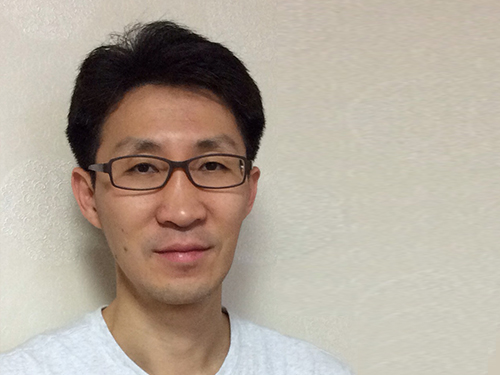 Professor Shin's Team Receives the Best Software Defined Network Solution Showcase Award
Professor Seungwon Shin of the Electrical Engineering School at KAIST and his research team won the Best Software Defined Networking (SDN) Solution Showcase Award hosted by the SDN World Congress, one of the biggest network summits held in Europe with over 2,000 participants. This year the conference took place in The Hague, the Netherlands, October 10-14, 2016.
SDN is an approach to computer networking that allows network administrators to respond quickly to changing business requirements via a centralized control console and to support the dynamic, scalable computing and storage needs of more modern computing environments such as data centers.
Collaborating with researchers from Queen’s University in the United Kingdom and Huawei, a global information and communications technology solutions provider in China, Professor Shin’s team, which is led by doctoral students Seungsoo Lee, Changhoon Yoon, and Jaehyun Nam, implemented a SDN security project called “DELTA.” ATTORESEARCH, a Korean SDN architecture and applications provider, conducted testing and verification for the project.
DELTA is a new SDN security evaluation framework with two main functions. It can automatically recognize attack cases against SDN elements across diverse environments and can assist in identifying unknown security problems within a SDN deployment.
The DELTA project consists of a control plane, the part of a network that carries signaling traffic and is responsible for routing; a data plane, the part of a network that carries user traffic; and a control channel that connects the two aforementioned planes. These three components have their own agents installed, which are all controlled by an agent manger. The agent manger can automatically detect any spots where the network security is weak.
Specifically, the project aimes to defense attacks against OpenFlow protocol, one of the first SDN standards; SDN controllers, a network operating system that is based on protocols; and network switch devices that use OpenFlow protocol.
The DELTA project was registered with the Open Networking Foundation, a user-driven organization dedicated to the promotion and adoption of SDN through open standards development, as an open source SDN security evaluation tool. This project is the only open source SDN which has been led by Korean researchers.
The SDN World Congress 2016 recognized the need for and importance of the DELTA project by conferring upon it the Best Solution Showcase Award. The Open Networking Foundation also widely publicized this award news.
Professor Shin said:
“In recent years, SDN has been attracting a large amount of interest as an emerging technology, but there still have not many SDN projects in Korea. This award acknowledges the advancement of Korean SDN technology, showing the potential for Korea to become a leader in SDN research.”
Picture: Major Components of the DELTA Project: Agents and Agent Manger
2016.10.25 View 9072
Professor Shin's Team Receives the Best Software Defined Network Solution Showcase Award
Professor Seungwon Shin of the Electrical Engineering School at KAIST and his research team won the Best Software Defined Networking (SDN) Solution Showcase Award hosted by the SDN World Congress, one of the biggest network summits held in Europe with over 2,000 participants. This year the conference took place in The Hague, the Netherlands, October 10-14, 2016.
SDN is an approach to computer networking that allows network administrators to respond quickly to changing business requirements via a centralized control console and to support the dynamic, scalable computing and storage needs of more modern computing environments such as data centers.
Collaborating with researchers from Queen’s University in the United Kingdom and Huawei, a global information and communications technology solutions provider in China, Professor Shin’s team, which is led by doctoral students Seungsoo Lee, Changhoon Yoon, and Jaehyun Nam, implemented a SDN security project called “DELTA.” ATTORESEARCH, a Korean SDN architecture and applications provider, conducted testing and verification for the project.
DELTA is a new SDN security evaluation framework with two main functions. It can automatically recognize attack cases against SDN elements across diverse environments and can assist in identifying unknown security problems within a SDN deployment.
The DELTA project consists of a control plane, the part of a network that carries signaling traffic and is responsible for routing; a data plane, the part of a network that carries user traffic; and a control channel that connects the two aforementioned planes. These three components have their own agents installed, which are all controlled by an agent manger. The agent manger can automatically detect any spots where the network security is weak.
Specifically, the project aimes to defense attacks against OpenFlow protocol, one of the first SDN standards; SDN controllers, a network operating system that is based on protocols; and network switch devices that use OpenFlow protocol.
The DELTA project was registered with the Open Networking Foundation, a user-driven organization dedicated to the promotion and adoption of SDN through open standards development, as an open source SDN security evaluation tool. This project is the only open source SDN which has been led by Korean researchers.
The SDN World Congress 2016 recognized the need for and importance of the DELTA project by conferring upon it the Best Solution Showcase Award. The Open Networking Foundation also widely publicized this award news.
Professor Shin said:
“In recent years, SDN has been attracting a large amount of interest as an emerging technology, but there still have not many SDN projects in Korea. This award acknowledges the advancement of Korean SDN technology, showing the potential for Korea to become a leader in SDN research.”
Picture: Major Components of the DELTA Project: Agents and Agent Manger
2016.10.25 View 9072 -
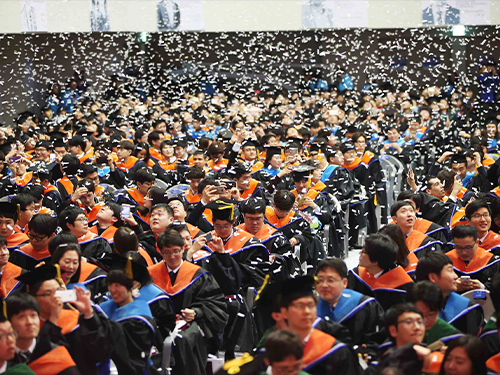 KAIST Commencement 2016
KAIST hosted its 2016 commencement ceremony on February 19, 2016 at the Sports Complex on campus.
KAIST celebrated the event with five thousand participants including graduating students, faculty, guests, Vice Minister Nam-Ki Hong of Science, ICT and Future Planning of Korea, Chairman Jang-Moo Lee of KAIST's Board of Trustees, and President Jeong-Sik Ko of the KAIST Alumni Association.
President Patrick Aebischer of the Swiss Federal Institute of Technology in Lausanne (EPFL), Switzerland, and the former Speaker of the National Assembly of Korea Chang-Hee Kang received honorary doctorates in science and technology for their contributions to the advancement of science and engineering in education and research.
KAIST granted 570 doctoral degrees, 1,329 master’s degrees, and 867 bachelor degrees on this day.
Yoon-Bum Lee of the Chemistry Department graduated with honors; Woo-Young Jin of the Mathematical Sciences Department received the Chairman’s Award of the KAIST Board and Eun-Hee Yoo of the Biological Sciences Department for the KAIST Presidential Award. Min-Hyun Cho and Yoon-Seok Chang were recipients of the President’s Award of the KAIST Alumni Association and the President’s Award of the University Supporting Association, respectively.
President Steve Kang addressed the ceremony and congratulated the graduates, saying,
“Now, your task is to make significant contributions to your communities: be leaders in your fields and remain active members of society. Given your academic knowledge and vision for the future, I encourage you to dream big.”
2016.02.23 View 42595
KAIST Commencement 2016
KAIST hosted its 2016 commencement ceremony on February 19, 2016 at the Sports Complex on campus.
KAIST celebrated the event with five thousand participants including graduating students, faculty, guests, Vice Minister Nam-Ki Hong of Science, ICT and Future Planning of Korea, Chairman Jang-Moo Lee of KAIST's Board of Trustees, and President Jeong-Sik Ko of the KAIST Alumni Association.
President Patrick Aebischer of the Swiss Federal Institute of Technology in Lausanne (EPFL), Switzerland, and the former Speaker of the National Assembly of Korea Chang-Hee Kang received honorary doctorates in science and technology for their contributions to the advancement of science and engineering in education and research.
KAIST granted 570 doctoral degrees, 1,329 master’s degrees, and 867 bachelor degrees on this day.
Yoon-Bum Lee of the Chemistry Department graduated with honors; Woo-Young Jin of the Mathematical Sciences Department received the Chairman’s Award of the KAIST Board and Eun-Hee Yoo of the Biological Sciences Department for the KAIST Presidential Award. Min-Hyun Cho and Yoon-Seok Chang were recipients of the President’s Award of the KAIST Alumni Association and the President’s Award of the University Supporting Association, respectively.
President Steve Kang addressed the ceremony and congratulated the graduates, saying,
“Now, your task is to make significant contributions to your communities: be leaders in your fields and remain active members of society. Given your academic knowledge and vision for the future, I encourage you to dream big.”
2016.02.23 View 42595 -
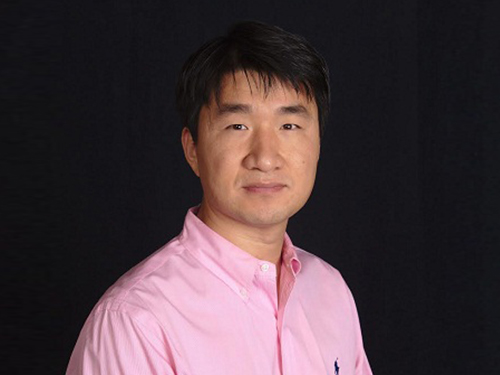 KAIST Graduate Han Receives a 2016 PECASE Award
President Barack Obama of the United States (US) announced 105 recipients of the 2016 Presidential Early Career Awards for Scientists and Engineers (PECASE) on February 18. Among the awardees was a graduate from the Department of Electrical Engineering at KAIST.
Dr. Jin-Woo Han has worked as a research scientist at the National Aeronautics and Space Administration (NASA) Ames Research Center since graduating from KAIST in 2010. This year, he is the only awardee who received a doctoral degree from a Korean university to become a recipient of the highest honor bestowed by the US government on science and engineering professionals in the early stages of their independent research careers.
The awards ceremony will take place in early spring at the White House in Washington, D.C.
Dr. Han has been involved in the development of radiation tolerant semiconductor devices as well as radiation and gas sensors under Dr. Meyya Meyyappan, Chief Scientist of the Center for Nanotechnology at NASA Ames Research Center.
KAIST and the NASA Ames Research Center made a research collaboration agreement in 2008, under which KAIST has sent 12 post-doctoral fellows to the center to date.
The PECASE awards, established in 1996 by President Bill Clinton, are coordinated by the Office of Science and Technology Policy within the Executive Office of the US President. Awardees are selected for their pursuit of innovative research at the frontiers of science and technology and their commitment to community services as demonstrated through scientific leadership, public education, or community outreach.
2016.02.23 View 10116
KAIST Graduate Han Receives a 2016 PECASE Award
President Barack Obama of the United States (US) announced 105 recipients of the 2016 Presidential Early Career Awards for Scientists and Engineers (PECASE) on February 18. Among the awardees was a graduate from the Department of Electrical Engineering at KAIST.
Dr. Jin-Woo Han has worked as a research scientist at the National Aeronautics and Space Administration (NASA) Ames Research Center since graduating from KAIST in 2010. This year, he is the only awardee who received a doctoral degree from a Korean university to become a recipient of the highest honor bestowed by the US government on science and engineering professionals in the early stages of their independent research careers.
The awards ceremony will take place in early spring at the White House in Washington, D.C.
Dr. Han has been involved in the development of radiation tolerant semiconductor devices as well as radiation and gas sensors under Dr. Meyya Meyyappan, Chief Scientist of the Center for Nanotechnology at NASA Ames Research Center.
KAIST and the NASA Ames Research Center made a research collaboration agreement in 2008, under which KAIST has sent 12 post-doctoral fellows to the center to date.
The PECASE awards, established in 1996 by President Bill Clinton, are coordinated by the Office of Science and Technology Policy within the Executive Office of the US President. Awardees are selected for their pursuit of innovative research at the frontiers of science and technology and their commitment to community services as demonstrated through scientific leadership, public education, or community outreach.
2016.02.23 View 10116 -
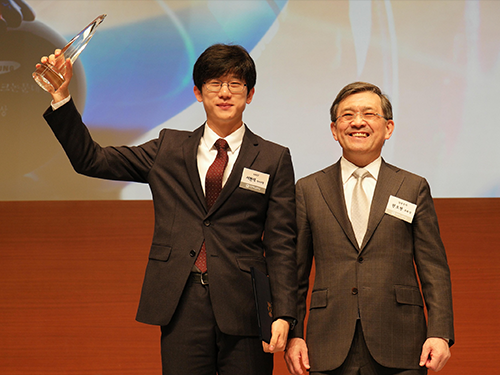 Ph.D. Candidate Seo Wins the Human Tech Paper Award
Hyun-Suk Seo, a doctoral student of KAIST’s Department of Electrical Engineering, received the grand prize of the “22nd Human Tech Paper Award” on February 3, 2016 from Samsung Electronics Co., Ltd.
Seo was the first to receive this prize ever since the Human Tech Paper Award was established 22 years ago. Until last year, the highest prize awarded for KAIST was a gold one.
The “Human Tech Paper Award” was established in 1994 by Samsung Electronics to discover and support outstanding scientists in the field of electrical engineering.
Entitled “Self-Gated Cardiac Cine MRI Using Phase Information,” Seo’s paper presented a technology that would reduce discomforts and inconveniences experienced by patients who take a magnetic resonance imaging (MRI).
This technology uses the speed changes of aorta and the abdominal movements of body to obtain the phase changes of magnetic resonance signals so that MRIs may be taken despite the organs’ movements.
Seo commented on his research, “I wanted to develop a technique that can make MRI a more comfortable experience. I will continue my research on this subject and hope to serve the needs of the society.”
In addition, the “Special Award,” which is given to schools, was awarded to KAIST. KAIST’s Department of Electrical Engineering has also been named the department that has received the second most awards (15 awards) this year.
Oh-Hyun Kwon, Vice President of Samsung Electronics, Steve Kang, President of KAIST, and Nak-In Seo, President of Seoul National University, participated in the event.
Picture: Hyun-Suk Seo (left), the recipient of the grand prize of the 2016 Human Tech Paper Award, and Oh-Hyun Kwon (right), Vice President of Samsung Electronics
2016.02.06 View 9556
Ph.D. Candidate Seo Wins the Human Tech Paper Award
Hyun-Suk Seo, a doctoral student of KAIST’s Department of Electrical Engineering, received the grand prize of the “22nd Human Tech Paper Award” on February 3, 2016 from Samsung Electronics Co., Ltd.
Seo was the first to receive this prize ever since the Human Tech Paper Award was established 22 years ago. Until last year, the highest prize awarded for KAIST was a gold one.
The “Human Tech Paper Award” was established in 1994 by Samsung Electronics to discover and support outstanding scientists in the field of electrical engineering.
Entitled “Self-Gated Cardiac Cine MRI Using Phase Information,” Seo’s paper presented a technology that would reduce discomforts and inconveniences experienced by patients who take a magnetic resonance imaging (MRI).
This technology uses the speed changes of aorta and the abdominal movements of body to obtain the phase changes of magnetic resonance signals so that MRIs may be taken despite the organs’ movements.
Seo commented on his research, “I wanted to develop a technique that can make MRI a more comfortable experience. I will continue my research on this subject and hope to serve the needs of the society.”
In addition, the “Special Award,” which is given to schools, was awarded to KAIST. KAIST’s Department of Electrical Engineering has also been named the department that has received the second most awards (15 awards) this year.
Oh-Hyun Kwon, Vice President of Samsung Electronics, Steve Kang, President of KAIST, and Nak-In Seo, President of Seoul National University, participated in the event.
Picture: Hyun-Suk Seo (left), the recipient of the grand prize of the 2016 Human Tech Paper Award, and Oh-Hyun Kwon (right), Vice President of Samsung Electronics
2016.02.06 View 9556 -
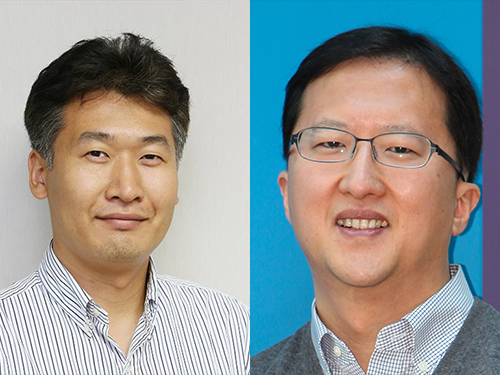 Professors Jeon and Choi Receive the Young Scientist Award
Professors Seokwoo Jeon of the Department of Materials Science and Engineering and Jang Wook Choi of the Graduate School of Energy, Environment, Water and Sustainability (EEWS) at KAIST received the Young Scientist Award.
The award ceremony took place at the Korea Press Center in Seoul. Presented by the Ministry of Science, ICT and Future Planning of Korea and the National Academy of Engineering of Korea, the Young Scientist Award is given to outstanding scientists under the age of 40 who have demonstrated excellence in their research in the field of natural science.
Each year the award is given to three scientists in different areas.
Professor Jeon was recognized for his achievement in creating a new property of materials. He studied synthesis and development of low-dimensional nanomaterials and developed a large area nanostructure.
Professor Choi’s research area was to discover optimal materials for rechargeable batteries. By applying his research, he developed rechargeable batteries with high efficiency, making the wearable system more feasible.
2016.01.11 View 12536
Professors Jeon and Choi Receive the Young Scientist Award
Professors Seokwoo Jeon of the Department of Materials Science and Engineering and Jang Wook Choi of the Graduate School of Energy, Environment, Water and Sustainability (EEWS) at KAIST received the Young Scientist Award.
The award ceremony took place at the Korea Press Center in Seoul. Presented by the Ministry of Science, ICT and Future Planning of Korea and the National Academy of Engineering of Korea, the Young Scientist Award is given to outstanding scientists under the age of 40 who have demonstrated excellence in their research in the field of natural science.
Each year the award is given to three scientists in different areas.
Professor Jeon was recognized for his achievement in creating a new property of materials. He studied synthesis and development of low-dimensional nanomaterials and developed a large area nanostructure.
Professor Choi’s research area was to discover optimal materials for rechargeable batteries. By applying his research, he developed rechargeable batteries with high efficiency, making the wearable system more feasible.
2016.01.11 View 12536